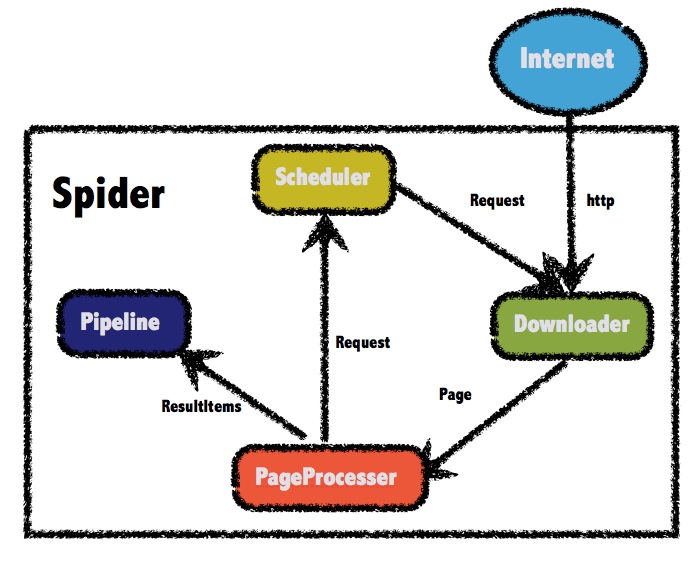|
|
||
|---|---|---|
| en_docs | ||
| webmagic-core | ||
| webmagic-extension | ||
| webmagic-lucene | ||
| webmagic-samples | ||
| webmagic-saxon | ||
| webmagic-selenium | ||
| zh_docs | ||
| .gitignore | ||
| .travis.yml | ||
| README.md | ||
| pom.xml | ||
| release-note.md | ||
| webmagic manual.md | ||
README.md
webmagic
A scalable crawler framework. It covers the whole lifecycle of crawler: downloading, url management, content extraction and persistent. It can simply the development of a specific crawler.
Features:
- Simple core with high flexibility.
- Simple API for html extracting.
- Annotation with POJO to customize a crawler, no configuration.
- Multi-thread and Distribution support.
- Easy to be integrated.
Install:
Add dependencies to your pom.xml:
<dependency>
<groupId>us.codecraft</groupId>
<artifactId>webmagic-core</artifactId>
<version>0.2.1</version>
</dependency>
<dependency>
<groupId>us.codecraft</groupId>
<artifactId>webmagic-extension</artifactId>
<version>0.2.1</version>
</dependency>
Get Started:
First crawler:
Write a class implements PageProcessor:
public class OschinaBlogPageProcesser implements PageProcessor {
private Site site = Site.me().setDomain("my.oschina.net")
.addStartUrl("http://my.oschina.net/flashsword/blog");
@Override
public void process(Page page) {
List<String> links = page.getHtml().links().regex("http://my\\.oschina\\.net/flashsword/blog/\\d+").all();
page.addTargetRequests(links);
page.putField("title", page.getHtml().xpath("//div[@class='BlogEntity']/div[@class='BlogTitle']/h1").toString());
page.putField("content", page.getHtml().$("div.content").toString());
page.putField("tags",page.getHtml().xpath("//div[@class='BlogTags']/a/text()").all());
}
@Override
public Site getSite() {
return site;
}
public static void main(String[] args) {
Spider.create(new OschinaBlogPageProcesser())
.pipeline(new ConsolePipeline()).run();
}
}
-
page.addTargetRequests(links)Add urls for crawling.
You can also use annotation way:
@TargetUrl("http://my.oschina.net/flashsword/blog/\\d+")
public class OschinaBlog {
@ExtractBy("//title")
private String title;
@ExtractBy(value = "div.BlogContent",type = ExtractBy.Type.Css)
private String content;
@ExtractBy(value = "//div[@class='BlogTags']/a/text()", multi = true)
private List<String> tags;
public static void main(String[] args) {
OOSpider.create(
Site.me().addStartUrl("http://my.oschina.net/flashsword/blog"),
new ConsolePageModelPipeline(), OschinaBlog.class).run();
}
}
Docs and samples:
The architecture of webmagic (refered to Scrapy)
Javadocs: http://code4craft.github.io/webmagic/docs/en/
There are some samples in webmagic-samples package.
Lisence:
Lisenced under Apache 2.0 lisence
Thanks:
To write webmagic, I refered to the projects below :
-
Scrapy
A crawler framework in Python.
-
Spiderman
Another crawler framework in Java.

